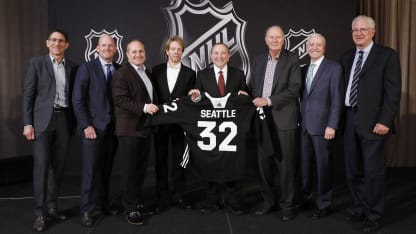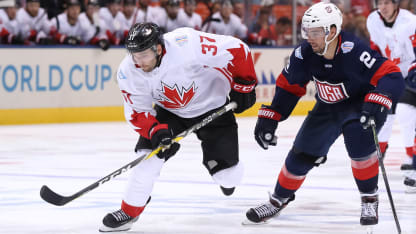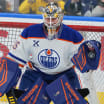SEATTLE -- The NHL is projecting the salary cap to rise to $87.7 million for next season, Commissioner Gary Bettman said after the Board of Governors meetings concluded Tuesday.
The salary cap is $83.5 million this season, up $1 million from 2022-23. It was $81.5 million from 2019-21 because of the financial impact of the COVID-19 pandemic.
The cap, which is expected to rise $4.2 million, has not increased more than $4 million season-over-season since it went up $4.5 million from $75 million in 2017-18 to $79.5 million in 2018-19.
Bettman also said the revenue projection for this season is $6.2 billion.
"I think most people will see it as good news," Bettman said of the salary cap increasing.
Bettman also provided an update on where the Arizona Coyotes are in their search for a location to build a new arena in the East Valley of the Greater Phoenix region. He said the Coyotes have identified a location and they're hoping to get it finalized in the coming weeks or couple of months.
"They understand it's important for it to get finalized in time for us to do next season's schedule," Bettman said.
The Coyotes are scheduled to play next season at Mullett Arena, the 5,000-seat facility on the campus of Arizona State University that they have made their home since the start of last season.
"It's the only place they can really play in Arizona," Bettman said.
But relocating the Coyotes could become a possibility if they do not provide the NHL firm plans to build a new arena at some point during this season so schedules can be completed in an appropriate time frame for next season.
"I think at the end of the day we're going to need some predictability as to where this is all going and Arizona is pretty comfortable that they can get it done in the next couple of months, the next few weeks," Commissioner Bettman said.
The NHL also updated the Board of Governors on cut resistant materials for necks, wrists and ankles.
The usage and demand for the materials has grown in the wake of the on-ice death of former NHL player Adam Johnson during a game in the Elite Ice Hockey League in Great Britain on Oct. 28. Johnson sustained a fatal cut to his neck from the skate blade of an opponent.
The NHL does not mandate the use of cut resistant materials and can't without cooperation and agreement from the NHL Players' Association, but Bettman said he encourages the players to wear the products available to them. He hesitated to say if or when the League and the NHLPA would mandate the use of such materials, but he thinks it will happen.
"We have a joint committee (Protective Equipment Sub-Committee) with the Players' Association, we're working cooperatively, there's a lot of studying that is going on and I think ultimately we may get there," Bettman said.
NHL deputy commissioner Bill Daly said the joint committee will meet in Toronto during All-Star Weekend in early February.
"We're going to talk about it then," Daly said. "This was much more of a report [to the Board of Governors] on what we've done historically and what we've been doing and the emphasis we've had on cut resistant materials."




















